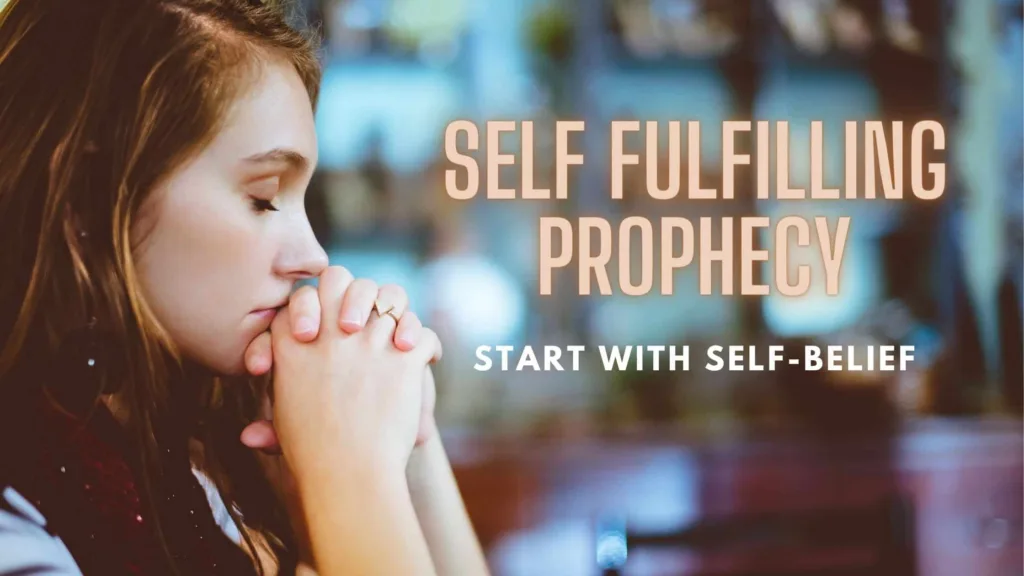Picture a special idea called the Self Fulfilling Prophecy. It’s like a mind trick that says what we believe and expect can change how we act and what happens in our lives. A smart person named Robert K. Merton thought of this idea a long time ago. The self-fulfilling prophecy is like a dance between what we think, believe, and do. Let’s learn more about what it is, how it works, and what it means in our everyday lives.
let’s talk about the self-fulfilling prophecy. It’s like a loop where what we think in our heads can come true because we act like it’s true. For example, imagine you have a test, and you believe you’ll do great. Because you think that, you study a lot, and guess what? You do well on the test. Now, flip it around. If you believe you’ll fail, you might not study much, and that can make the failure happen, just like you thought.
So, it’s like our thoughts and beliefs can shape what really happens because our actions follow what we believe. It’s like a little magic trick our minds play on us!

Mechanisms of the Self-Fulfilling Prophecy
- Formation of Beliefs:
- Think of it like creating thoughts in your mind. You start by thinking about things, like how good you are at something or what you think will happen in the future. These thoughts come from your past experiences, what you learn from your culture, and what people in society say is true.
- Behavioral Confirmation:
- Once you decide what you believe, you usually act in ways that match those beliefs. If you think you’re good at something, you’ll act with confidence. But if you believe you’re not good at it, your actions might show a lack of confidence. These actions, guided by what you think will happen, can also influence how others see you and change the situation around you.
- Social Feedback Loop:
- Imagine your beliefs and actions creating a loop of feedback from the people around you. For example, if you believe you’ll fail at something and act like you lack confidence, others might treat you as if you’re not capable. This makes your initial belief stronger because it becomes a cycle – what you think affects how you act, and how you act affects how others see and treat you.
- Outcome Alignment:
- The whole cycle comes full circle when your actions make your initial belief come true. If you believed you would fail at something and acted that way, it might lead to a real failure. This strengthens your confidence in your beliefs, making it a repeating pattern – you think something will happen, you act in a way that makes it happen, and then it happens just like you thought.
Related Topic: Perspicacity: Your Secret To Better Choices
Self Fulfilling Prophecy Examples:
- Education:
- Think about school. If a teacher thinks a student will do really well, they might give lots of support and encouragement. This makes the student feel important, and they might work extra hard and do great in their studies. But, if a teacher thinks a student will struggle, they might not give as much help, and this can make it harder for the student to do well.
- Interpersonal Relationships:
- Now, imagine two people in a relationship. If one person believes the other is not trustworthy, they might act in a way that makes the other person feel pushed away. This behavior can make the accused person feel like they’re not trusted, and that feeling might actually cause trust problems in the relationship. It’s like a cycle – what one person believes and how they act can affect the other person and the relationship as a whole.
Implications and Mitigation
- Positive Self-Fulfilling Prophecy:
- Let’s talk about making good things happen by thinking positively. If we understand that good thoughts can lead to good outcomes, we can feel strong. For example, if you think you’ll do well in something, that belief might make you work hard, and you might actually do great. Thinking positively can be like a secret power for making good things happen.
- Breaking Negative Cycles:
- Now, imagine stopping bad things from happening because we believe they will. It’s important to know when negative thoughts are causing problems. If we know this, we can do things to change those thoughts. For example, if someone always thinks they’ll fail, they might not try their best. But, with help, like talking to someone or getting therapy, they can challenge these thoughts and start believing in themselves, breaking the cycle of failure.
- Educational and Organizational Settings:
- Think about schools or workplaces. Teachers and leaders can create a happy atmosphere by expecting the best from students or team members. If a teacher believes in a student’s abilities, they might provide more help and encouragement. This positive belief can make the student want to work harder and do better in their studies. The same goes for workplaces – if leaders believe in their team, it can make everyone feel good and lead to better work. Understanding and using positive thoughts can be like a superpower. It helps us believe in ourselves, break free from negative patterns, and make places where everyone can do their best.
The self fulfilling prophecy is like a big thought in our minds that teaches us how what we believe, how we act, and what happens are all linked. If we understand that our thoughts can make things happen, it’s vital to think good stuff. Knowing both the good and not-so-good parts of these ideas helps us go through our personal and social lives with a clear understanding and purpose.
